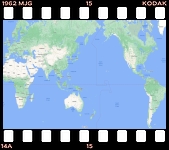On 10th February I was up at 7:30 and had breakfast in my room, courtesy of my previous visit to the supermarket. I was told to get bus #20 to the curiously named port of Llau Llau, where there is a jetty for the boats operating on Lago Nahuel Huapi – the large lake to the north and west of Bariloche.
The boat was a modern fast tourist catamaran – a total change in every respect from the slow car ferry in Chile. The experience was completely different – most of the seats were inside and for all the comfort and speed I felt somewhat isolated from the great outdoors. It was very much a “tour” – most of the passengers were well-heeled Argentine day-trippers. I looked like the only person on a one-way trip.
By good fortune I got chatting to the 2 young ladies who were in the row in front of me. They are sisters from Buenos Aires – Marcela and Silvina – and they adopted me for the rest of the time I was with the tour! Marcela speaks some English which made communication a little easier.
The catamaran headed west at speed to the end of the lake, then crossed over to the north side. We all got off and went to see a cascade – Cascada los Cántaros – in the forest, for half an hour. Then back to the boat and we crossed over to a jetty on the south side. This location was called Puerto Blest, and was where I was to say goodbye to the Catamaran. Marcela, Silvina and I wandered along the beach a little way and had a snack, since the little hotel/restaurant at Puerto Blest was a tourist trap with outrageous prices.
Having done bus and boat once each, the next leg was a bus. Rather a small and beaten-up bus, which ran from Puerto Blest south up a narrow dirt track (which is isolated from the rest of the road system) to a beautiful green lake called Lago Frias. At the northern end of this lake is a jetty which proudly calls itself Puerto Alegre. At this jetty there was another boat waiting, and Marcela, Silvina and I waited our turn to board. Not everyone from the catamaran had come for this optional visit to Lago Frias.
The boat headed down the length of the lake, with steep mountainsides on every side, to reach the jetty at the southern end, and thus the port of Puerto Frias. We all got off. This was the turn around point for Marcela and Silvina, but they had time to explore. Marcela wandered up the road with me a little way to get a better view. Then it was time to say “chau” – and for me to be given another phone number in Buenos Aires, which I’m very likely to call when I get there.
The Argentinean immigration post is actually at Puerto Frias – basically the only building there. I had my passport stamped, while my fellow passengers were all getting back on the boat to disappear back to Bariloche. I knew that I was about 20 km from the first village in Chile, from where the next boat will leave, the next day. It wasn’t going to be impossible to walk there, but I’d been led to believe that there would be bus of some sort, costing $20. However the guide from the boat told me that “no”, there was no bus on Sundays.
But then the friendly border police told me that there was a truck that happened to be heading over the border which could take me for free if I asked nicely. I asked nicely, and was invited to climb in the open back, along with a few logs that it was carrying. The truck went very slowly but it was faster than walking. I was starving by this stage and shoveled in some food while wedging myself securely amongst the logs. There was no other traffic – this rough dirt road over the frontier pass is isolated from both the Argentinean and Chilean road systems.
The road zigzagged up through the trees to the border, then descended into Chile. Occasional views could be had through the forest. Finally the truck got down to the valley level in Chile and stopped at the first building, which turned out to be Chilean customs. I got off, took a photo of the truck, said “nothing to declare” to the customs guy, and off we went again.
The truck stopped again a few km short of the village of Peulla, and the driver announced that the large yellow house we had just reached would likely be able to offer me accommodation. I knocked and asked, and they said that yes, for 2000 Chilean pesos ($4) I was welcome to stay there.
I then walked the 2 km down to Peulla since I hadn’t reached Chilean immigration yet. When I got there the officials weren’t very keen on the idea that I should have my passport stamped and then go back up the road towards the border again, to stay in the yellow house. They said I could have my passport stamped in the morning instead, on my way through. So tonight I am not officially in any country…
Back at the yellow house they gave me a nice meal, and then let me watch an Australian film on the TV. Unfortunately the electricity comes from a turbine in the river – the water is too low for a reliable supply, and a bit before the end of the film the power failed. So I don’t know what happened at the end of the film!


Haha! What an adventure! Haha! I am laughing at your frustration at not knowing what happened at the end of the film. You had your own adventure story going on all day. 🙂 The film ending could not have been as good.